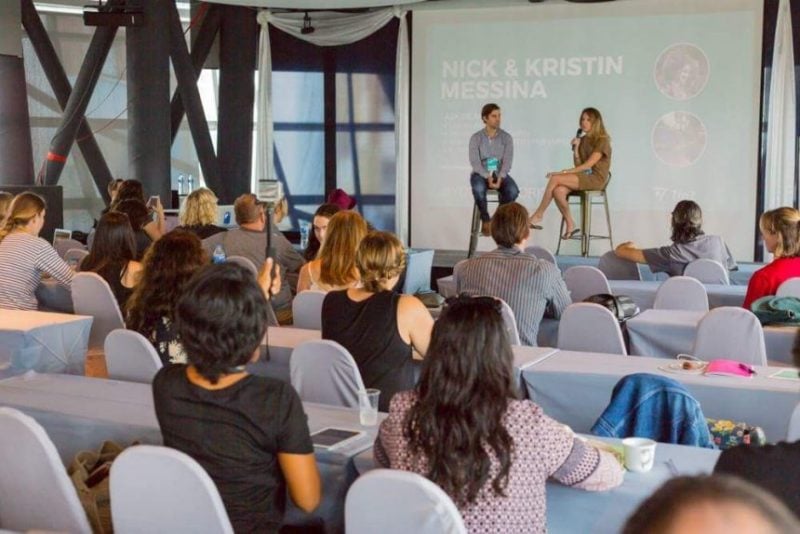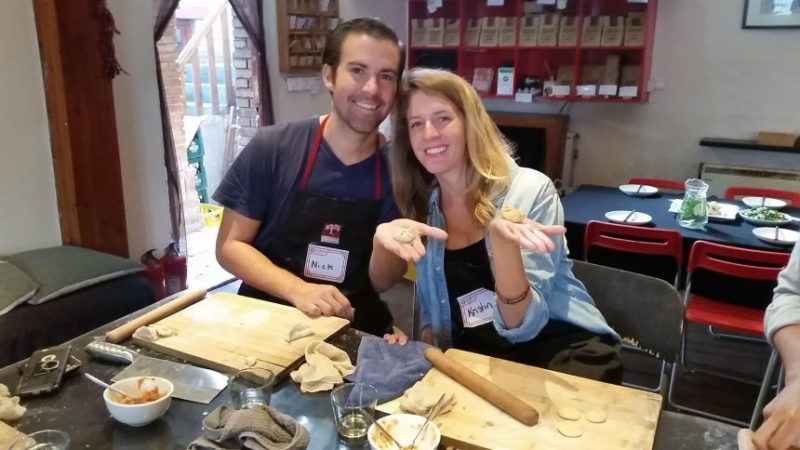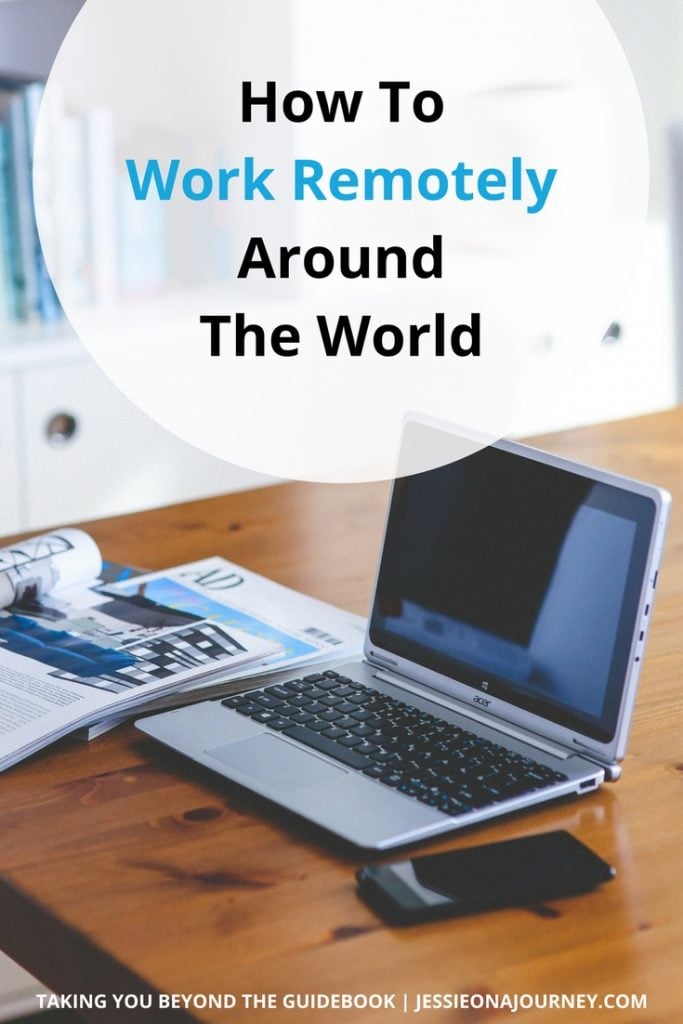How To Work Remotely Around The World

YonderWork’s Nick and Kristin Messina at a digital nomad conference
By Michele Herrmann, Regular Contributor
This post is part of Jessie on a Journey’s Inspiring Travelers series. Have you ever wondered what it would be like to work remotely while traveling the world? If you’re not sure where to start, Nick Messina is here to help. Messina is the co-founder of YonderWork, a travel company leading remote workers on two-month trips around the globe. Skeptical? He and his wife Kristin are living proof it’s possible to combine work and play. In fact, the pair quit their corporate jobs to work full-tie on YonderWork. Most of their 2016 was spent exploring South America and Asia, working from co-working spaces, connecting with local startups, and hosting skill sharing events. Jessie on a Journey caught up with Messina to learn more about YonderWork, and how travelers can successfully obtain and manage remote employment.1. What led you and Kristin to pursue this venture?
Kristin and I have always loved travel. When we were dating, we traveled to Lebanon, Egypt, Turkey and Indonesia. From the start we knew that travel would be a big part of our lives together. We were both working full-time and getting our MBAs, and had been planning to take at least a year off to do a worldwide trip before settling down to start a family. So after finishing graduate school, we decided it was time to go. Our original plan was to spend six months in South America and six months in Southeast Asia.2. What are the challenges and benefits of working remotely?
There are many documented remote working benefits for both individuals and employers. These include increased employee satisfaction, higher productivity, real-estate savings and increased work-life balance. The challenges of remote working are up to the individual and whether they have the discipline to work without supervision. They should be comfortable without daily face-to-face interaction, although the increase in digital communication tools and rise in co-working spaces are helping to address these concerns.3. What have been your best and worst experiences with working remotely? What did you learn from them?
My best experience has been working with my distributed YonderWork colleagues, where each of us has the flexibility to work when and where we are most productive. I have learned that building a culture of trust makes working so much more enjoyable for all parties and leads to innovation and success. My worst experience with working remotely would have to be in India, where even the local Starbucks did not have Wi-Fi. Rolling blackouts in some areas also made it very difficult to stay connected and productive.
YonderWork co-founders Nick and Kristin Messina
4. What’s essential for success with working remotely?
There are a few key items we’ve have found to make remote work successful. First of all, it’s helpful to separate your living space from your workspace, but it’s really about individual preference and what works for you. Some days I prefer a quieter space with little distractions, and other days I find it helpful to be in a place that has more energy. The next thing is to work when you are most productive, whether that be early in the morning, later in the afternoon, or into the evening hours burning the midnight oil. Everyone has a different style for when they can get in the zone. Also critical is the need for reliable, uninterrupted Wi-Fi. You cannot work with substandard internet speeds, as it interrupts your working rhythm. By pairing your remote work style with the latest remote working tools, you can easily set yourself up for success. Working remotely is quite a change from commuting to an office and sitting in a cubicle for a strict set of hours every day. It requires self-discipline and a strong ability to manage your own time. For someone with no experience working remotely, I recommend a trial period at first. Work on a specific project or for one to two days a week out of the office and see if you feel comfortable and more productive.5. What’s YonderWork’s place within the remote working field?
Kristin and I started thinking about YonderWork right after finishing graduate school in September of 2015. We were planning our trip abroad and were initially focused on doing some consulting and freelancing work. At the same time, we started going to events at some local co-working spaces in Washington, D.C. — where I’d lived — and found a lot of value working out of these spaces. At this time, people were wondering how to become a digital nomad and the “digital nomad” subculture was getting big, as we knew traveling with a community would be a great way to experience the world and make connections across cultures. The mission of YonderWork is to empower people to have the freedom to pursue happiness and fulfill their potential. We scout each of our locations and ensure they have great co-working spaces, strong entrepreneurial ecosystems and are desirable places to go. We also bring in thought leaders to run workshops and do speaker events for our participants, as professional development is a key component of our experiences. This year, we have five experiences planned in South America, Southeast Asia and Europe. We are also building a YonderWork solution specifically for employers, so stay tuned as we roll this out.
The YonderWork team
6. Do you find employers are opening up more to this setup?
Employers are increasingly becoming open to remote working. According to the U.S. Department of Labor, in the last five years there has been a 50% increase in companies with the majority of their teams working remotely. Companies like Buffer and Toptal are completely distributed with no office at all, hiring employees across the globe. Employees are seeking more work-life balance and see the requirement to work a strict 9-5 as irrelevant and ineffective. Employers recognize this and are making the shift to remote working in order to attract and retain top talent.7. How can travelers find legit opportunities for working remotely?
For full-time remote positions, there are some great job boards that specialize in remote work, including two of my favorites, We Work Remotely and FlexJobs. For contract and freelancing work, there are also several websites including Guru, Cloudpeeps and Freelancer.com.Have you ever dreamed of working remotely?

Travel Blogging Tips | How to work remotely | How to travel the world
Further Exploration:
Going Against Societal Norms: Following My Dreams Instead Of The Crowd [Blog Inspiration] Vagabonding: An Uncommon Guide to the Art of Long-Term World Travel [Great Reads] Clever Travel Companion Pickpocket-Proof Garments [Travel Safety]

Hi, I’m Jessie on a journey!
I'm a conscious solo traveler on a mission to take you beyond the guidebook to inspire you to live your best life through travel. Come join me!
Want to live your best life through travel?
Subscribe for FREE access to my library of fun blogging worksheets and learn how to get paid to travel more!
Turn Your Travel Blog Into A Profitable Business
Subscribe to my email list to snag instant access to my library of workbooks, checklists, tutorials and other resources to help you earn more money -- and have more fun -- blogging. Oh, and it's totally FREE! :) // Privacy Policy.